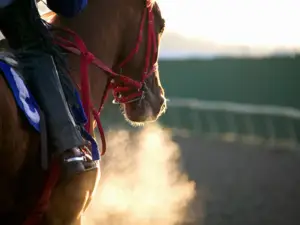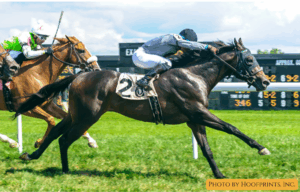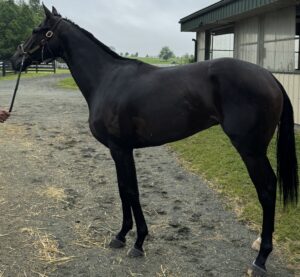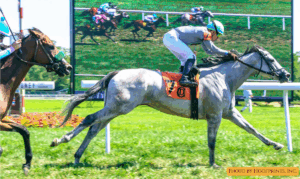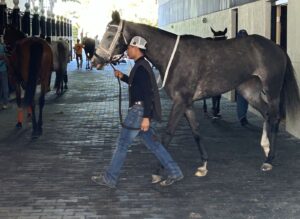There’s nothing like it.
Your horse—yes, your horse—barreling down the stretch, nostrils flared, muscles rippling, ears pinned in full fight mode.
The jockey urges for more, and your heart pounds in sync with every stride. Whether it’s a claiming race at a local track or a stakes race under the bright lights, that feeling never gets old.
It’s electric. It’s ownership.
The benefits of owning a racehorse go far beyond prize money or investment potential.
It’s the thrill of competition, the strategy behind selecting the right horse, and the pride of knowing you’re part of a sport that dates back centuries.
Sure, there are financial rewards—big purses, breeding opportunities, and tax benefits of racehorse ownership—but for most, the real reward is the experience itself.
And here’s the thing: Owning a racehorse is more accessible than ever. You don’t need a bottomless bank account to get in the game.
From sole ownership to racehorse syndicates and fractional ownership, there are multiple ways to own a piece of a champion. Whether you want full control over training decisions or prefer to split costs and risks with a group, there’s an ownership model to fit your goals.
This isn’t just an investment—it’s an entry ticket to an entirely different world. Let’s break down exactly what makes investing in racehorses such a rewarding move.
The Experience and Prestige of Racehorse Ownership
Owning a racehorse isn’t just about betting on the right horse—it’s about being on the right horse.
Ask any owner, and they’ll tell you: there’s a rush that comes with seeing your silks in the paddock, getting the inside scoop from your trainer, and standing in the winner’s circle after a hard-fought victory.
The benefits of owning a racehorse extend far beyond financial rewards. It’s an experience that blends competition, strategy, and prestige into one of the most electrifying investments in sports.
The Perks of Horse Ownership
Most people watch a race from the grandstand or their couch. Owners experience it from the inside.
From the moment a young racehorse enters training, there’s a thrill in tracking its development—morning workouts, training milestones, and that first official race.
Getting updates from your trainer, hearing about your horse’s progress, and watching them transform into a competitor creates an emotional connection that’s hard to describe.
And then there’s race day.
Nothing compares to seeing your horse saddled, and shaking hands with your jockey before they head to the gate.
The tension builds. The gates fly open.
And for those few minutes, you’re not just watching—you’re living it.
Beyond the track, racehorse ownership advantages come with VIP perks that most sports fans can only dream of.
Owners get behind-the-scenes access at some of the most prestigious events in the world—think the Kentucky Derby, Breeders’ Cup, and Royal Ascot. Exclusive hospitality areas, private events, and connections with top trainers and industry insiders make ownership as much a lifestyle investment as a financial one.
Racehorse Ownership as a Smart Investment
Of course, there’s another reason people get into ownership: the potential for big financial returns.
Some of the biggest stars in racing history were purchased for modest sums. Horses like Seabiscuit, California Chrome, and Mine That Bird were all under-the-radar purchases that went on to make millions.
For savvy investors, investing in racehorses can be more than just a passion project—it can be a lucrative venture with the right approach.
Successful owners diversify.
Instead of putting all their money into one horse, they invest in multiple horses or participate in racehorse syndicates to spread the risk. Partnerships and fractional ownership allow investors to own stakes in several promising horses, increasing the chances of hitting big without shouldering the full cost.
At the highest levels, racehorse investments don’t stop at race winnings—successful horses go on to lucrative breeding careers, generating millions in stud fees or producing high-dollar offspring that continue the legacy.
Racehorse ownership is part thrill, part strategy, part business. And when done right? It can be all three at once.
The Financial Benefits of Owning a Racehorse
Racehorse ownership isn’t just about the thrill—it can also be a serious financial play. While the sport carries risks, the right horse, the right races, and the right investment strategy can generate substantial returns.
From race winnings to breeding rights to tax benefits of racehorse ownership, there are multiple ways to turn a passion for racing into a smart financial move.
Race Winnings and Financial Potential
The most obvious way to profit from a racehorse? Winning races.
Purses vary dramatically depending on the level of competition. A top-tier stakes race like the Kentucky Derby offers millions in prize money, while lower-level allowance and claiming races pay out smaller sums. Even at mid-tier tracks, winning a few solid purses can cover training costs and turn a profit for the right horse.
But race winnings aren’t the only way owners cash in. Financial benefits of owning a racehorse also include:
- Breeding rights: If a racehorse proves successful on the track, stallion or broodmare prospects can generate massive profits in breeding. Top stallions command six-figure stud fees, producing foals that sell for millions.
- Sponsorships and endorsements: Owners with high-profile horses can secure brand deals that bring in extra revenue beyond race purses
- Appearance fees: Winning a high-profile race means getting invited to future events, sometimes with lucrative incentives for showing up
A well-managed horse has multiple avenues to generate income, even beyond its racing days.
But what about the financial risks? That’s where tax advantages come into play.
Tax Benefits of Racehorse Ownership
One of the biggest advantages that investing in racehorses offers is the ability to write off expenses.
The tax benefits of racehorse ownership can make a significant difference in offsetting costs and making ownership more sustainable.
Key tax advantages include:
- Depreciation: The IRS allows racehorses to be depreciated as a business asset, spreading out their value over several years
- Business deductions: If the horse is owned as part of a legitimate business, expenses like training, transportation, boarding, and veterinary care can be written off
- Tax write-offs: Travel to races, entry fees, and even ownership-related hospitality costs may qualify as deductible expenses
However, there’s a major distinction between owning a horse as a business investment versus a hobby. To qualify for tax deductions, owners must prove they’re in the industry with the intent of making a profit—meaning careful financial management and documentation are key.
For investors who structure their ownership wisely, racehorses can serve as both an exciting passion and a strategic financial asset.
Understanding the Costs and Risks of Ownership
Racehorse ownership comes with big rewards, but it’s not all winner’s circle celebrations and million-dollar payouts.
The reality?
It costs money—sometimes a lot of money—to get a horse to the gate, let alone into the winner’s circle.
Before jumping in, every owner needs to understand the costs of owning a racehorse and the risks involved in turning a profit.
The Costs of Owning a Racehorse
Owning a racehorse isn’t just about the initial purchase price—it’s about sustaining that horse through training, racing, and beyond. Some horses pay their way through winnings, but most require significant financial backing just to stay in training.
Ongoing expenses include:
- Training fees: Trainers charge monthly rates for full-time care and conditioning
- Veterinary bills: Routine checkups, vaccinations, and potential injury treatments can add up fast
- Jockey fees: Jockeys typically earn a percentage of winnings, but even for non-winners, they get a base riding fee
- Transportation costs: Shipping a horse to and from races, especially for stakes races in different states, isn’t cheap
- Race entry fees: The bigger the race, the bigger the cost—some stakes races require five-figure entry fees just to compete
The financial demands vary depending on the level of racing.
A claiming horse at a smaller track has much lower costs than a stakes-level thoroughbred competing at elite tracks. Yearlings require time to develop, while older horses may already be race-ready.
Every ownership decision impacts the financial investment required.
The Reality of Owning a Racehorse for Profit
Most new owners dream of striking it big—buying a racehorse, winning major purses, and walking away with a massive return.
But owning a racehorse for profit is not guaranteed.
The truth? Many racehorses never win a race, let alone become champions.
To increase the chances of profitability, smart owners take a strategic approach.
They work with top professionals—trainers, bloodstock agents, and racing managers who maximize a horse’s potential and make the right calls on conditioning, race selection, and career progression.
The right connections can make all the difference between an average racehorse and a stakes contender.
Some owners focus on the claiming game, where horses are bought and sold based on performance. Unlike yearlings or unproven prospects, claiming horses have already been tested on the track, giving investors more insight into their ability.
This approach minimizes risk while allowing owners to target runners with potential for immediate returns.
Others diversify through syndicates and partnerships, spreading risk across multiple horses rather than putting all their money into a single runner. Racehorse syndicates and fractional ownership make it possible to own shares in multiple horses, increasing the chances of success while keeping costs manageable—an especially smart move for first-time owners.
Owning a racehorse can be one of the most exciting investments in the world—but it’s not a get-rich-quick scheme. It requires patience, strategy, and a willingness to accept the risks along with the rewards.
Is Racehorse Ownership Right for You?
Owning a racehorse is unlike any other investment. It’s a thrill, a strategy, and a passion all wrapped into one.
The benefits of owning a racehorse go beyond financial potential—there’s the rush of competition, the prestige of being part of the sport, and the unique tax advantages that make ownership even more appealing.
But while racehorse ownership is rewarding, it’s not something to dive into without a plan.
Careful financial awareness, a solid investment strategy, and the right team behind you are all key to making it a successful and enjoyable experience.
Regardless if you choose sole ownership, a partnership, or fractional ownership through a racehorse syndicate, understanding the risks and costs is just as important as chasing the rewards.
At the end of the day, owning a racehorse is a one-of-a-kind experience that few investments can match.
Whether you’re in it for the passion, the prestige, or the potential profit, there’s nothing quite like watching your horse thunder down the stretch, knowing you’re not just a spectator—you’re part of the sport.



